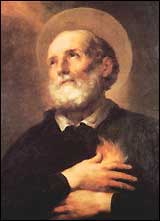Saint Philip Neri
Feast Day: May 26
Saint Philip, one of the glories of Florence, was born of an illustrious Christian family in that city of Tuscany, in 1515. His parents lived in the fear of God and the observance of His commandments, and raised their son to be obedient and respectful. Already when he was five years old, he was called good little Philip. He lost his mother while still very young, and it seemed he should have died himself when he was about eight or nine years old. He fell, along with a horse, onto a pavement from a certain height. Though the horse landed on top of him, he was entirely uninjured. He attributed his preservation to a special intervention of God, destined to permit him to dedicate his life to the service of God.
He fled from a prospective inheritance to Rome, where he desired to study, and there undertook to tutor the two sons of a nobleman who offered him refuge. He led so edifying a life that word of it reached Florence, and his sister commented that she had never doubted he would become a great Saint. He studied philosophy and theology, and after a short time seemed to need to study no longer, so clear were the truths of God in his mind. He always kept the Summa Theologica of Saint Thomas Aquinas near him for consultation; this and the Holy Bible were his only books.
Saint Philip seemed surrounded by a celestial splendor, the effect of his angelic purity, which he never lost in spite of the many dangers that surrounded him; he came victorious from every combat, through prayer, tears and confidence in God. He often visited the hospitals to serve the sick and assist the poor. At night he would go to the cemetery of Saint Callixtus, where he prayed near the tombs of the martyrs.
At the age of 36 he was not yet a priest, and his confessor commanded him under obedience to receive Holy Orders, which he did in the same year of 1551. He joined a society of priests and heard many confessions. Saint Ignatius of Loyola called him Philip the Bell, saying he was like a parish church bell, calling everyone to church, but remaining in his tower — this because he determined so many souls to enter into religion, without doing so himself. He himself was about to follow Saint Francis Xavier’s renowned examples, by going to India with twenty young companions, but was advised by an interior voice to consult a saintly priest. He was then told that the will of God was that he live in the city of Rome as in a desert.
The famous Society of Saint Philip, called The Oratory, began when a group of good priests joined him in giving instructions and conferences and presiding prayers; for them he drew up some rules which were soon approved. He became renowned all over Italy for the instances of bilocation which were duly verified during his lifetime. Many holy servants of God were formed in the Oratory, a society of studious priests, made ready by ten years of preparation in the common life for a service founded on sacerdotal perfection. Saint Philip died peacefully in 1595 on the Feast of Corpus Christi at the age of 80, having been ill for only one day. He bears the noble titles of Patron of Works of Youth, and Apostle of Rome.
Patronage
Rome – US Army Special Forces – Works of Youth
Source: sanctoral.com

Birthplace
Born
21 July 1515
Florence, Republic of Florence
Death
26 May 1595 (Age 79)
Rome, Papal States
Canonized
Rome, Papal States
Shrine/Relics/Tomb
Rome, Italy
Learn more:
Franciscan Media
Saint Philip Neri – FranciscanMedia.org
Philip Neri was a sign of contradiction, combining popularity with piety against the background of a corrupt Rome and a disinterested clergy: the whole post-Renaissance malaise. At an early age, Philip abandoned the chance to become a businessman, moved to Rome from Florence, and devoted his life and individuality to God…
Word On Fire
St. Philip Neri and the Wisdom of Holy Fools- WordOnFire.org
May 26, 2020 — A man missing half his beard. “Fr. Philip Neri,” the pallid butler proclaimed. According to the people of Rome, the man was a living saint. According to the cultured, cultivated eyes of his onlookers, he was a lunatic. Moreover, there was no mistaking it for an accident. The famed priest had neatly trimmed his beard on one side of his face, and meticulously removed it on the other…
